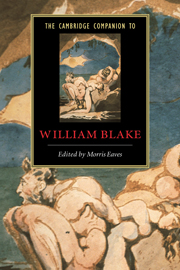Book contents
- Frontmatter
- 1 Introduction
- Part I Perspectives
- 2 William Blake and his circle
- 3 Illuminated printing
- 4 Blake's language in poetic form
- 5 Blake as a painter
- 6 The political aesthetic of Blake's images
- 7 Blake's politics in history
- 8 Blake and religion
- 9 Blake and Romanticism
- Part II Blake's works
- A glossary of terms, names and concepts in Blake
- Guide to further reading
- Seeing Blake's art in person
- Index
- Series List
9 - Blake and Romanticism
from Part I - Perspectives
Published online by Cambridge University Press: 28 May 2006
- Frontmatter
- 1 Introduction
- Part I Perspectives
- 2 William Blake and his circle
- 3 Illuminated printing
- 4 Blake's language in poetic form
- 5 Blake as a painter
- 6 The political aesthetic of Blake's images
- 7 Blake's politics in history
- 8 Blake and religion
- 9 Blake and Romanticism
- Part II Blake's works
- A glossary of terms, names and concepts in Blake
- Guide to further reading
- Seeing Blake's art in person
- Index
- Series List
Summary
For a number of years in the long middle of the twentieth century the term Romanticism conjured up for students of English literature two dates and half a dozen names. The dates became so self-evident that no one remarked on their oddness. Neither 1789 nor 1832, the standard limits of the period, were chosen for literary-historical reasons. The first commemorates the French Revolution, the second the Great Reform Bill that extended the vote to many affluent males who had not had it before. George Crabbe, Jeremy Bentham, and Sir Walter Scott all died in 1832, but their passing has not been used as the measure of the end of an era. 1789 happened to be the year of William Blake's Songs of Innocence, but its appearance has not usually been regarded as foundational for Romanticism: that honor has much more commonly been bestowed upon Wordsworth and Coleridge's jointly authored first edition of Lyrical Ballads (1798). This has had the effect of distancing the literary from the political revolution, leading to lively arguments about what the politics of Lyrical Ballads (and Romanticism generally) might be given its appearance during the British counter-revolution, after the widespread loss of faith in French republicanism and following the government's repressive measures against British radicals. Blake has nonetheless mostly counted as one of the names that the mention of Romanticism has been supposed to invoke, along with Wordsworth, Coleridge, Keats, Shelley, and Byron. All poets, all men. Jane Austen was usually left out of any efforts at categorizing Romanticism, along with all the other novelists of the period: she has tended to appear in literary history as an isolated genius in the story of the nineteenth-century novel. The drama was even further distanced: the common consensus was that there was not much of it and that what was there was not very interesting.
- Type
- Chapter
- Information
- The Cambridge Companion to William Blake , pp. 169 - 188Publisher: Cambridge University PressPrint publication year: 2003
- 2
- Cited by



